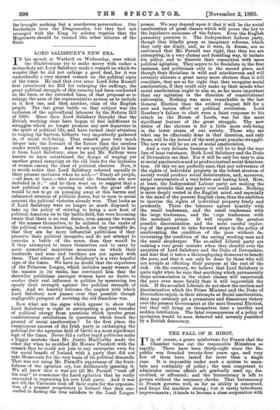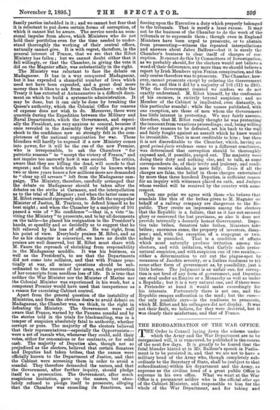THE FALL OF M. RIBOT.
IT is, of course, a grave misfortune for France that the Chamber turns out the responsible Ministries so rapidly. There have been thirty-eight -since the Re- public was founded twenty-four years ago, and very few of them have lasted for more than a single year. It is impossible under such a system to main- tain any continuity of policy ; the men competent to administer serious affairs are gradually used up, dis- credited, or affronted; and the bureaucracy is left to govern without the necessary checks. That bureaucracy in France governs well, as far as ability is concerned, and keeps the machine strong ; but it rarely introduces improvements ; it tends to become a close corporation with family parties imbedded in it ; and we cannot but fear that it is reluctant to put down certain forms of corruption, of which it cannot but be aware. The service needs an occa- sional impulse from above, which Ministers who do not hold their portfolios even for the time needed to under- stand thoroughly the working of their central offices, naturally cannot give. It is with regret, therefore, in the general interest of France, that we see that the Ribot Ministry has fallen ; but we cannot doubt either that it fell willingly, or that the Chamber, in giving the vote it did on the Magnier affair, was substantially in the right. The Ministry was reluctant to face the debate on Madagascar. It has in a way conquered Madagascar, but it has expended a shameful number of lives which need not have been expended, and a great deal more money than it likes to ask from the Chamber ; while the Treaty it has extorted at Antananarivo is a difficult docu- ment on which to build a systematic administration. It may be done, but it can only be done by breaking the Queen's authority, which the Colonial Office for reasons of expense does not wish to do. Moreover, there were quarrels during the Expedition between the Military and Naval Departments, which the Government, and especi- ally the President, are very anxious to conceal, because if once revealed in the Assembly they would give a great shock to the confidence now so strongly felt in the com- pleteness of the national organisation for war. These blunders will hardly be exposed if a new Ministry comes into power, for it will be the cue of the new Premier, who is irresponsible, to ask the Chambers " for patriotic reasons " to " accept the victory of France," and not inquire too narrowly how it was secured. The critics, aware that they are killing the dead, will accede to that request ; and the whole truth will only be known when two or three years hence a few millions more are demanded to " clear up all arrears " left from the Madagascar cam- paign. The Ministry, therefore, carefully arranged that the debate on Madagascar should be taken after the debates on the strike at Carmaux, and the interpellation as to the trial of M. Magnier ; and when the latter came on M. Ribot remained rigorously silent. He left the unpopular Minister of Justice, M. Trarieux, to defend himself as he best might ; and when the Chamber by a majoriity of 101 passed a vote of " No confidence "—that is, a vote " in- viting the Ministry " to prosecute, and to lay all documents on the table—be placed his resignation in the President's hands, so speedily and so decidedly as to suggest that he felt relieved by his loss of office. He was right, from his point of view. Everybody praises M. Ribet, and as far as his character is concerned, we have no doubt the praises are well deserved, but M. Ribot must share with M. Faure the reproach of shrinking from responsibility in the Madagascar muddle. It was his business, as well as the President's, to see that the Departments did not come into collision, and that with France prac- tically at war, all minor questions should be sub- ordinated to the success of her arms, and the protection of her conscripts from needless loss of life. It is true that neither the War Minister nor the Minister of Marine nor the Colonial Minister was experienced in his work, but a competent Premier would have used that inexperience as a reason for exercising Cabinet control.
Apart from the general question of the instability of Ministries, and from the obvious desire to avoid debate on Madagascar, the Chamber was, we think, in the right in defeating the Ministry. The Government were well aware that France, warned by the Panama scandal and by the stories told in the trials for blackmailing, was in a temper of suspicion absolutely fatal to authority, whether corrupt or pure. The majority of the electors believed that their representatives—especially the Opportunists— were a set of rascals who, whenever they could, sold their votes, either for concessions or for contracts, or for solid cash. The majority of Deputies also, though not so prejudiced as the electors, believed that certain Senators and Deputies had taken bribes, that the names were officially known to the Department of Justice, and that the Cabinet were screening them in order to avoid a scandal. They therefore demanded the names, and that the Government, after further inquiry, should pledge itself to a prosecution. The Government, after much suspicious hesitation, gave up the names, but abso- lutely refused to pledge itself to prosecute, alleging that the Chamber was exceeding its functions, and forcing upon the Executive a duty which properly belonged to the tribunals. That is surely a lame excuse. It may not be the business of the Chamber to do the work of the tribunals or to supersede them ; though even in England Ministers have been urged to prosecute, or to abstain from prosecuting—witness the repeated interpellations and answers about Jabez Balfour—but it is surely the Chamber's business to clear itself of charges of cor- ruption. It cannot do this by Committees of Investigation, as we probably should, for the electors would not believe a word of their deliverance, any more than we should believe a report by Irish Members upon Fenian conspiracies, and the only course therefore was to prosecute. The Chamber, how- ever, cannot prosecute except by ordering the Government to do so, and this it did by a majority of 101 (311 to 210). Why the Government resisted we confess we do not exactly understand. M. Ribot himself, by the confession of his enemies, is entirely beyond suspicion ; and no Member of the Cabinet is implicated, even distantly, in this particular scandal ; while the names published, with one exception, are those of men whom the Government has little interest in protecting. We may fairly assume, therefore, that M. Ribot really thought he was protecting the innocent from vexatious proceedings; and, being willing for other reasons to be defeated, set his back to the wall and fairly fought against an assault which he knew would be irresistible. That is most creditable to him ; but then it is not discreditable to the Chamber, which, having on good prinui-facie evidence come to a different conclusion, was determined that corruption should be thoroughly exposed and, if possible, purged out. The majority were doing their duty and nothing else, and to talk, as some correspondents do, of their levity and jealousy, and readi- ness to receive slander, is mere folly. Even if all the charges are false, the belief in those charges entertained by more than three hundred Deputies, is sufficient reason for an inquiry with witnesses placed on oath, and Judges whose verdict will be received by the country with some respect.
Upon one point we agree with those who believe that scandals like this of the bribes given to M. Magnier on behalf of a railway company are dangerous to the Re- public. They create an impression among the electors that the Republic is a failure, that as it has not secured glory or recovered the lost provinces, so also it does not provide internally a decently honest Government. Depu- ties take bribes, Senators take bribes, Ministers take bribes ; enormous sums, the property of investors, disap- pear ; and, with the exception of a scapegoat or two, nobody is punished. That is a condition of affairs which must naturally produce irritation among the electors, and with irritation, what Carlyle calls preter- natural suspicion, and with suspicion one of two results,— either a determination to cut out the plague-spot by measures of Jacobin severity, or a listless readiness to try some other form of government as, by possibility, just a little better. The judgment is an unfair one, for corrup- tion is not bred of any form of government, and Deputies can steal under an Empire or a Monarchy as well as under a Republic ; but it is a very natural one, and if there were a Pretender at hand it would make exceedingly for his interests. Fortunately there is not one, and the Republic escapes suffocation in the mud ; but the cure— the only possible cure—is the readiness to prosecute, which M. Ribot and his colleagues did not display. It was not their fault, we believe, for they were deceived, but it was clearly their misfortune, and that of France.



















































 Previous page
Previous page